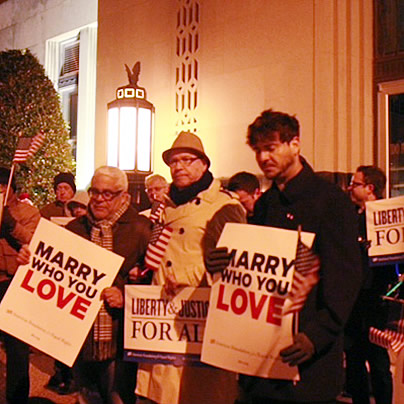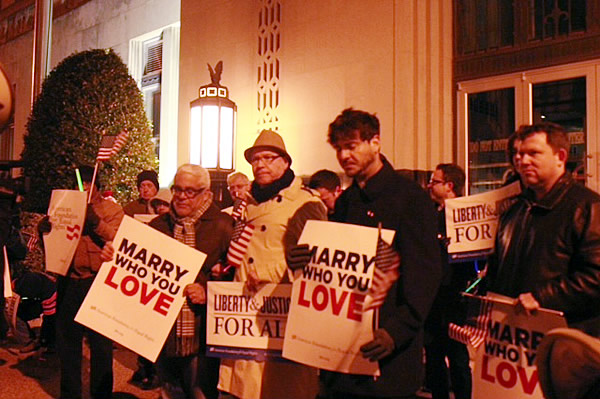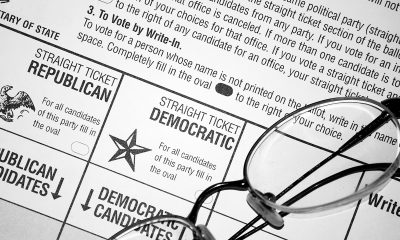Local
ACLU, Lambda Legal seek to join Virginia marriage lawsuit
Groups’ case against state gay nuptials ban certified class action


Lambda Legal and the ACLU on Wednesday petitioned a federal appeals court to intervene in a case that challenges Virginia’s same-sex marriage ban. (Photo courtesy of Casey Hartman)
The two groups – which filed their own federal lawsuit against the commonwealth’s constitutional amendment that bans nuptials for same-sex couples last August on behalf of two lesbian couples from the Shenandoah Valley – submitted a brief with the 4th U.S. Circuit Court of Appeals in Richmond to join a separate lawsuit brought by Timothy Bostic and Tony London of Norfolk and Carol Schall and Mary Townley of Chesterfield last year.
U.S. District Judge Arenda L. Wright Allen’s Feb. 13 ruling in the Bostic case was appealed to the federal appellate court earlier this week.
“From the beginning, both of these cases have proceeded on parallel tracks, and for the good of all couples in the state, we hope it will remain that way,” said Joshua Block, staff attorney with the ACLU Lesbian Gay Bisexual and Transgender Project. “This motion just ensures that all affected couples have their day in court.”
U.S. Circuit Judge Michael F. Urbanski late last month certified the Lambda Legal and ACLU lawsuit filed on behalf of Victoria Kidd and Christy Berghoff of Winchester and Joanne Harris and Jessica Duff of Staunton as a class action. Urbanski earlier this month said he would not hold oral arguments in the case – and he is expected to issue his ruling in the coming weeks.
“Marriage is a fundamental right of all Virginians,” said Claire Guthrie Gastañaga, executive director of the ACLU of Virginia. “That’s why it’s important that all couples in both cases be represented in the appeals court at the same time.”
Former U.S. Solicitor General Ted Olson and David Boies, who successfully argued against California’s Proposition 8 before the U.S. Supreme Court last year, are among the lawyers representing Bostic and London and Schall and Townley.
Virginia Attorney General Mark Herring last month announced he will not defend the commonwealth’s marriage amendment that voters in 2006 approved by a 57-43 percent margin.
“The Bostic case is extremely well positioned heading into the Fourth Circuit,” American Foundation for Equal Rights Executive Director Adam Umhoefer told the Washington Blade in a statement. “The district court issued an order that, if it is affirmed, will ensure that all gay and lesbian Virginians who wish to marry, or to have their marriage recognized, can do so.”
Herring’s spokesperson, Michael Kelly, declined to specifically comment on the Lambda Legal and ACLU request to join the Bostic case.
“Attorney General Herring’s priority remains ensuring that higher courts have an opportunity to hear this case as quickly as possible to settle the fundamental issues it presents,” said Kelly.
Matthew D. McGill, co-counsel for the plaintiffs in the Bostic case, questioned why the two groups petitioned the 4th U.S. Circuit Court of Appeals to join the Bostic case.
“The addition of new parties to the case at this late stage risks delaying the proceedings, and there is not a moment to lose when gay and lesbian couples and families across Virginia – and other states in the Fourth Circuit – are experiencing real harm,” said McGill. “We hope the Harris plaintiffs and their lawyers will continue to support our shared goal of marriage equality by filing an amicus brief alongside us.”
A source involved in the legal process who asked to remain anonymous told the Blade there are “grave and serious consequences for an unwarranted ACLU intervention.” These could include the possibility that other groups from West Virginia, North Carolina and South Carolina that fall under the 4th U.S. Circuit Court of Appeals’ jurisdiction could seek to join the case if allowed.
“If intervention were granted, it could adversely slow down the current appeals process – and time is critical when it comes to attaining marriage equality for all Virginians,” said the source. “There is not a day to lose. Groups like the ACLU can be supportive by simply filing amicus briefs.”
“We are eager for the Fourth Circuit to move ahead swiftly in the Bostic case,” added Umhoefer. “Any delay in the appeals process means that gay and lesbian couples and their families will continue to suffer prolonged harm under unjust laws. We welcome the ACLU to participate as amicus curiae in the case.”
James Esseks, director of the ACLU’s Lesbian Gay Bisexual Transgender and AIDS Project, told the Blade the plaintiffs in the Harris case and their lawyers have been “appointed as representatives of a class of 14,000 same-sex couples in Virginia.” He added the motion to intervene in the Bostic lawsuit are to “do right” by the thousands of gays and lesbians in Virginia who are either married in another jurisdiction or want to exchange vows in the commonwealth.
“This is not about an either or thing,” Esseks told the Blade, noting the Bostic case is not a class action. “This is about an and thing.”
Greg Nevins of Lambda Legal echoed Esseks.
“There still are a lot of moving parts in this,” Nevins told the Blade. “We’ll eventually just do what we can to do the best on this particular case. No one knows where the chips are going to fall.”
District of Columbia
Gay ANC member announces candidacy for Ward 1 D.C. Council seat
Community leader Brian Footer seeking seat held by Brianne Nadeau

Gay Advisory Neighborhood Commissioner Brian Footer, a community activist who has been involved for many years in local and national government affairs, has announced his candidacy for the Ward 1 D.C. Council seat up for election in 2026.
Footer, a Democrat, will be running in the city’s June 2, 2026, Democratic primary for the Ward 1 Council seat, but it is uncertain whether he will be running against incumbent Ward 1 Council member Brianne Nadeau (D). Nadeau has not yet announced if she plans to run for re-election for a fourth term following her 12 years on the Council.
Nadeau has been a longtime vocal supporter of the LGBTQ community.
If Footer were to win the primary and the November 2026 general election, he would become the Council’s second openly gay member. Ward 5 Council member Zachary Parker (D) is currently the 13-member Council’s only gay member.
Footer is a three-term ANC commissioner who currently serves as Chair of ANC 1E, which represents the city’s Adams Morgan neighborhood.
“Brian has worked at every level of government — federal, state, and local — building a career rooted in public service, aging policy, and inclusive urban planning,” a statement on his campaign website says.
“I’m running for Council because too many people in Ward 1 are doing everything right and still feel ignored by the city they call home,” Footer states on his website.
“I’m running because we can do better,” his statement continues. “That means making housing more affordable, addressing homelessness with real solutions, and keeping our neighborhoods safe with smart, community focused strategies.”
When contacted by the Washington Blade for comment, Nadeau said she was not ready at this time to discuss her plans about running again or about Footer’s candidacy.
“The primary is a ways away, and I’m very focused right now on the budget and the stadium deal and all the work that we’re doing at the Council,” she told the Blade. “So, I really haven’t had time to turn to my plans. So, as a result, I’m also not going to be commenting on anybody else who is determined that they’re running at this time.”
She first won election to the Council in 2014 after she defeated four-term gay Ward 1 Council member Jim Graham in the Democratic primary after Graham became embroiled in an ethics controversy.
In the 2022 Democratic primary Nadeau defeated gay challenger Salah Czapary in a three-candidate race, by a margin of 48.5% of the vote compared to Czapary’s 30.9%.
With the third candidate, Sabel Harris, receiving 20.4%, the outcome showed that the two challengers had a combined total vote count higher than Nadeau.
Further details of Footer’s candidacy can be accessed from his campaign website, brianfooterdc.com.
District of Columbia
Gay GOP group hosts Ernst, 3 House members — all of whom oppose Equality Act
Log Cabin, congressional guest speakers mum on June 25 event

U.S. Sen. Joni Ernst (R-Iowa) and three women Republican members of the U.S. House appeared as guest speakers at the June 25 meeting of Log Cabin Republicans of D.C., the local chapter of the national LGBTQ Republican group with that same name.
The U.S. House members who joined Ernst as guest speakers at the Log Cabin meeting were Celeste Maloy (R-Utah), Kat Cammack (R-Fla.), and Julia Letlow (R-La.).
Neither D.C. Log Cabin Republicans President Andrew Minik nor spokespersons for Ernst or the three congresswomen immediately responded to a request by the Washington Blade for comment on the GOP lawmakers’ appearance at an LGBTQ GOP group’s meeting.
“Please join us for an inspiring evening as we celebrate and recognize the bold leadership and accomplishments of Republican women in Congress,” a D.C Log Cabin announcement sent to its members states.
“This month’s meeting will highlight the efforts of the Republican Women’s Caucus and explore key issues such as the Protection of Women and Girls In Sports Act and the broader fight to preserve women’s spaces in society,” the message says.
It was referring to legislation pending in Congress calling for banning transgender women from participating in women’s sports events.
According to media reports, Ernst and the three congresswomen have expressed opposition to the Equality Act, the longstanding bill pending in Congress calling for prohibiting discrimination based on sexual orientation and gender identity in the areas of employment, housing, and public accommodations.
The Log Cabin announcement says the meeting was scheduled to take place at the Royal Sands Social Club, which is a restaurant and bar at 26 N St., S.E. in the city’s Navy Yard area.
D.C. Log Cabin member Stuart West, who attended the meeting, confirmed that Ernst and the three congresswomen showed up and spoke at the event.
“It was a good turnout,” he said. “I would definitely say probably 30 or 40 people attended.” West added, “Four women came to talk to a group of mostly gay men. That’s something you don’t see very often.”
District of Columbia
D.C. police seek public’s help in July 5 murder of trans woman
Relative disputes initial decision not to list case as hate crime

D.C. police are seeking help from the public in their investigation into the murder of a transgender woman who they say was shot to death at about 12:30 a.m. on Saturday, July 5, on the 2000 block of Benning Road, N.E.
But the police announcement of the fatal shooting and a police report obtained by the Washington Blade do not identify the victim, 28-year-old Daquane ‘Dream’ Johnson of Northeast D.C., as transgender. And the police report says the shooting is not currently listed as a suspected hate crime.
It was local transgender activists and one of Johnson’s family members, her aunt, who confirmed she was transgender and said information they obtained indicates the killing could have been a hate crime.
“On Saturday, July 5, at approximately 12:51 a.m., Sixth District officers were flagged down in the 2000 block of Benning Road, Northeast, for an unconscious female,” a July 5 D.C. police statement says. “Upon arrival, officers located an adult female victim suffering from gunshot wounds,” it says.
“D.C. Fire and EMS responded to the scene and transported the victim to a local hospital where after all lifesaving efforts failed and the victim was pronounced dead,” the statement says.
A separate police flyer with a photo of Johnson announces an award of $25,000 was being offered for information leading to the arrest and conviction of the person or persons responsible for the murder.
The flyer identifies D.C. police Homicide Detective Natasha Kennedy as being the lead investigator in the case and says anyone with information about the case should contact her at 202-380-6198.
Longtime D.C. transgender rights advocate Earline Budd told the Blade that one of the police investigators contacted her about the case and that she also spoke to Detective Kennedy. Budd said police confirmed to her that Johnson was a transgender woman.

One of Johnson’s family members, Vanna Terrell, who identified herself as Johnson’s aunt, told the Blade that Johnson used the first name of Dream and had planned to legally adopt that name instead of Daquane but had not gotten around to doing so.
Terrell said she and other family members learned more about the incident when one of two teenage high school students who knew Johnson’s brother contacted a friend and told the friend that they recognized Johnson as they witnessed the shooting. Terrell said the friend then called her to tell her what the friend learned from the two witnesses.
According to Terrell, the witnesses reportedly saw three men approach Johnson as Johnson walked along Benning Road and one of them called Johnson a derogatory name, leading Terrell to believe the men recognized Johnson as a transgender woman.
Terrell said one of the witnesses told the friend, who spoke to Terrell, that the man who shot Johnson kept shooting her until all of the bullets were fired. Budd, who said she spoke to Terrell, who also told her what the witnesses reported, said she believed the multiple shots fired by the shooter was an “overkill” that appears to have been a hate crime. Terrell said she too believes the murder was a hate crime.
In response to an inquiry from the Blade, Officer Ebony Major, a D.C. police spokesperson, stated in an email, “At this point there is nothing in the investigation that indicates the offense was motivated by hate or bias.”
Terrell said a memorial gathering to honor Johnson’s life was scheduled to be held Saturday, July 12, at River Terrace Park, which is located at 500 36th St., N.E. not far from where the shooting occurred.

-

 Federal Government1 day ago
Federal Government1 day agoTreasury Department has a gay secretary but LGBTQ staff are under siege
-

 Virginia2 days ago
Virginia2 days agoDefying trends, new LGBTQ center opens in rural Winchester, Va.
-

 Opinions3 days ago
Opinions3 days agoUSAID’s demise: America’s global betrayal of trust with LGBTQ people
-

 District of Columbia1 day ago
District of Columbia1 day agoGay GOP group hosts Ernst, 3 House members — all of whom oppose Equality Act











